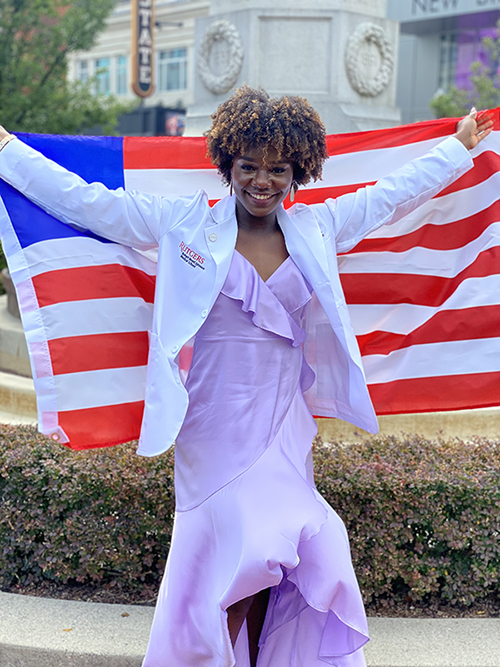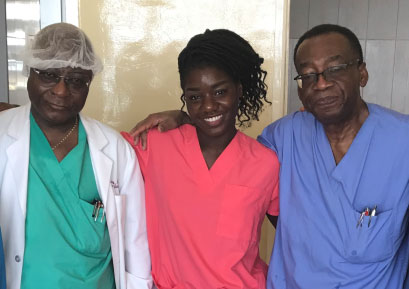
Update April 2023: Faith Blamon, IHS ’20, Rutgers ’26, is the current M1 class president.
Hometown: Paynesville, Liberia West Africa/ Cinnaminson, New Jersey
Undergraduate: Monmouth University, BS in Biology, Molecular Cell Physiology
Can you tell me a little about yourself before you came to Drexel?
My family and I moved from Liberia to Trenton, New Jersey, following the Liberian Civil War. Before Drexel, I attended Monmouth University. I am not sure if I am still considered a first-generation college student, since my mother went back to school and earned her bachelor’s degree the same year as me. Go Mom!
When did you know that you wanted to go into medicine?
Service is one of my family’s core values. My father is a pastor, and we have been helping those who are in need for as long as I can remember. Through my church, I have had the opportunity to mentor inner city youth, distribute toys at Christmas, provide healthful foods to those in need, as well as start and operate a daycare to give children in Trenton the same chance at a quality education as a child in a more affluent town, like Cinnaminson.
Often sick, I spent a good portion of my childhood in the hospital. Unfortunately, I became familiar with the concept of death at an early age, since many of the friends I made in the ICU were not fortunate to walk out of there. Medicine piqued my interest when I noticed the love and care the health care professionals showed me and other patients. They seemed to have all the answers, were patient, and fought their hardest to make sure we got better. They were intellectuals but could also feel deeply for others, a perfect balance. It seemed medicine was where I could do the most good and hurt the least amount of people.
Why did you choose to apply to Drexel’s Interdisciplinary Health Sciences (IHS) program?
Applying to the Interdisciplinary Health Sciences program was my redemption after failing to excel as an undergraduate student. I did not have good studying habits in high school but got good grades anyway. In college, the difficulty of coursework increased, and I worked multiple jobs and competed in athletics. With the increase in demand and my lack of good learning habits, I failed to thrive. At the time, I did not understand the root of my problem, so I accepted the lie that I was the “dumb athlete.” I decided to stick to being an athlete, but later found myself having an existential crisis.
At the conclusion of my senior year, I had made it to the U.S. Outdoor Track and Field Championships, where I competed alongside Olympians. Everything was paid for; I was flown to California, stayed in a nice hotel and had massages, all because I was considered a pro athlete. I should have felt pride and joy, but all I could think was, “How am I going to get into medical school with these terrible grades?”
Knowing I would not be able to get into medical school right way, I enrolled in a medical assistant certification program so I could still work with patients and be in the medical field. The preceding summer, I read books, articles and studies, and watched videos on how to learn and the habits of an A student. I excelled in medical assisting school and graduated with honors. This made me suspect that I actually had what it took to become a doctor.
After working as a medical assistant for a few months, I stopped feeling challenged. I wanted to see if I could handle rigorous coursework, so I applied to Drexel. If I could excel here, I would apply to medical school and pursue my dream. The IHS program was the program I qualified for, and it seemed like exactly what I needed.

How is the program going so far?
The program is going well because Interdisciplinary Health Sciences is a community. The instructors are phenomenal; they teach in a way that makes material both interesting and understandable. There is a sense of community in the IHS program. Dr. Anita Gaurnier-Hausser and Matt Sanuck (our program advisors) provide guidance based on the goals of each individual. Before starting the first semester, I spoke with Matt and he walked me through an entire timeline from the beginning of my program to the conclusion and application to medical schools afterward. We check in regularly to make sure I am hitting the proper benchmarks to achieve my goal.
In addition, the program harbors a peer mentor program that has been a great help to me; last year my mentor set me up for success and I still contact him regularly with questions. I am now the leader of that mentoring program, alongside Lesley Desriviere, in hopes of providing that same guidance to other students.
Can you tell me about any research that you have been doing?
Currently, I am working on a muscle reconstitution project with Dr. Shae Padrick in the Department of Biochemistry & Molecular Biology. We hope to find a therapy to treat patients with muscular diseases like cardiomyopathies, a group of diseases that cause sudden and premature death in seemingly healthy individuals.
To give some background, biochemistry has terrified me in the past, so I chose this lab to challenge myself. I anticipated being nervous and confused most of the time, but I have been fortunate to have Dr. Padrick as my PI. He makes sure I understand what I am doing and why I am doing it, and asks me to explain concepts back to him. He questions me to target gaps in understanding but, most importantly, Dr. Padrick is patient and nonjudgmental. He does not mind explaining things multiple times and in different ways; he uses blackboards, models, anything to make sure I understand the material. I am learning at a rate that amazes me and am thankful for the opportunity to work with such a caring intellectual.
Are you involved in any extracurricular activities?
Yes, I work on several projects with my church, Bethel World Outreach Ministries. Most remarkably, this past November (2019) I traveled to Liberia for a surgical mission trip alongside other coordinators, surgeons, doctors, nurses, a pharmacist, a photographer and evangelists. We coordinated with the medical professionals and associated volunteers who live in Liberia to make the trip a success. We donated 114 hospital beds to one of the major hospitals in Liberia (the John F. Kennedy Memorial Hospital) and performed 84 surgeries during our stay. The target of this trip was to bring medicine to those experiencing barriers to care, i.e., living far away from a medical facility or not having the funds to pay for care.
Our second site, the Darlingston G. Johnson Clinic, was used for nonsurgical patients. The facility also faced difficulties with providing care. When we arrived, there were no medications in the clinic, workers needed training, there was no electricity and they used only fans to keep cool. Our team stocked the pharmacy, trained the workers, provided a high-power generator, installed air conditioning units and cleaned the facility in anticipation of patient intake. When we finally opened the doors, we were able to serve over 1,000 patients and donate purses filled with feminine hygiene products. Our goals were to help the people while we were there and also leave the clinic in better condition to help the public after we left.
We are now planning our second trip to both Liberia and Sierra Leone in November 2020. We hope to eventually bring quality health care to all of Africa.
What are you planning to do after you graduate?
After graduation, I will take the MCAT and apply to medical schools. While awaiting my results, I will continue working with the surgical missions, since my ultimate goal is to improve the quality of life for people in Liberia.
What advice do you have for students who are considering coming to Drexel’s IHS program?
Decide on your goals and talk to the admissions officers to see if the program aligns with those goals. The counselors are honest, the faculty is knowledgeable, and you are always treated with respect and kindness. As long as you are willing to put in the work and know when to ask for help, you can excel in this program. Everyone, from your instructors to your peers, wants to see you succeed; that’s the IHS spirit. The rest is up to you.